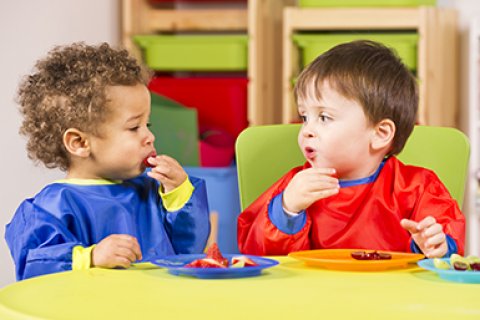Prosocial Behaviour: Sharing behaviour and Cooperation

Generally, prosocial behaviour is defined as behaviour that is intended to benefit another. Although the driving factors underlying prosocial behaviour are not yet completely clear, there is no doubt that prosocial behaviour always happens in interpersonal and social contexts. Family, as one of the most important social contexts of young children, takes a significant role in children’s prosocial development. However, after children make the transition from the home context to the school context, their social experiences with (same-age) peers become increasingly important for their prosocial behaviour development. Therefore, this research project specifically examines (pro)social behaviour in the peer context. We focus on different types of prosocial behaviour.

Project 1: Sharing behaviour
This project is a replication and extension of a famous study on food sharing of young children (Birch & Billman, 1986). A total of 95 children (3-5 years) participated twice in our experiment, once with a friend and once with an acquaintance. During the experiment the children received food, which was unequally distributed. The target child received 10 pieces each of preferred and non-preferred food and the recipient received only 1 piece of each food.
The aim of the project was to gain more insight into factors that may influence sharing behaviour of young children. We examined several social-contextual factors:
- Relationship (do children share more food with friends than with acquaintances?)
- Value of the object (do children share more of the non-preferred food than preferred food?)
- Previous experience (do children share more food if others shared food with them?)
- Sex (do girls share more food than boys?)
- Age (do older children share more food than younger children?)
In addition, we are also interested in the strategies that children use during sharing. In order to gain more insight into the way children try to get (preferred) food and which strategies are most successful, we also look at the interactions between the children during the experiment.
Funding: Netherlands Organization for Scientific Research (NWO)

Project 2: Cooperation
The focus of this project is on cooperation between young children. We aim to study this by using an (economic) game in which the reward is dependent on the choices of both children. For this purpose, we adapted the game in a way that is attractive to young children.
We want to study the influence of several social-contextual factors on cooperation in young children:
- Relationship (do friends coordinate their decisions better than acquaintances?)
- Training (does cooperation increase when children receive information about the reward structure?)
- Sex (do girls coordinate better than boys?)
Update: Due to the Corona virus, data collection on primary schools is postponed.
A similar study was also carried out among 200 university students. All students participated online (via MS Teams) in pairs. At the start of the experiment, students only received minimal instructions and thus had to discover the reward structure during the game. Half of the participants played the game in a condition in which they were allowed to communicate with each other, the other half was not allowed to communicate.
> More information about the experiment and the reward structure (in Dutch).
Researchers
Collaboration
- Prof. dr. E. H. M. Sterck, Behavioral Biology (Utrecht University)
- Prof. dr. S. G. Brosnan, Psychology, Philosophy, and the Neuroscience Institute (Georgia State University, USA)

